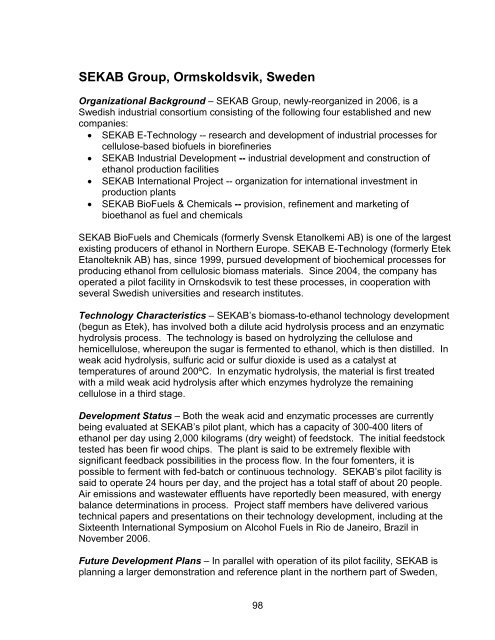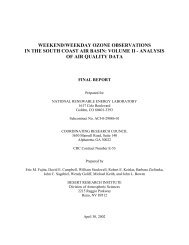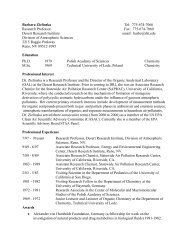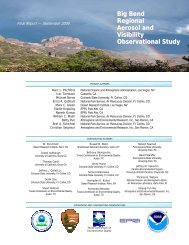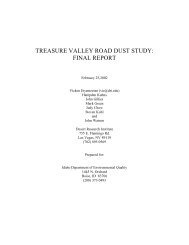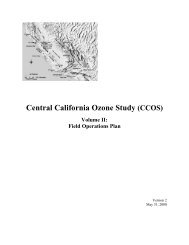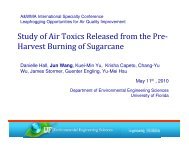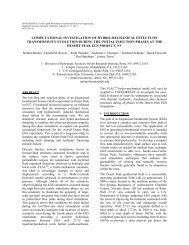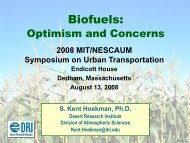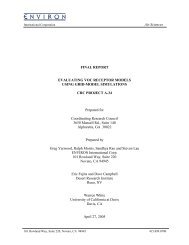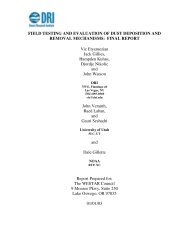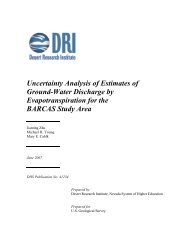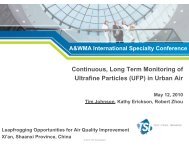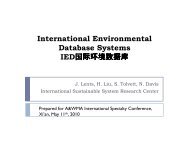Assessment of Conversion Technologies for Bioalcohol Fuel ...
Assessment of Conversion Technologies for Bioalcohol Fuel ...
Assessment of Conversion Technologies for Bioalcohol Fuel ...
You also want an ePaper? Increase the reach of your titles
YUMPU automatically turns print PDFs into web optimized ePapers that Google loves.
SEKAB Group, Ormskoldsvik, Sweden<br />
Organizational Background–SEKAB Group, newly-reorganized in 2006, is a<br />
Swedish industrial consortium consisting <strong>of</strong> the following four established and new<br />
companies:<br />
SEKAB E-Technology -- research and development <strong>of</strong> industrial processes <strong>for</strong><br />
cellulose-based bi<strong>of</strong>uels in biorefineries<br />
SEKAB Industrial Development -- industrial development and construction <strong>of</strong><br />
ethanol production facilities<br />
SEKAB International Project -- organization <strong>for</strong> international investment in<br />
production plants<br />
SEKAB Bio<strong>Fuel</strong>s & Chemicals -- provision, refinement and marketing <strong>of</strong><br />
bioethanol as fuel and chemicals<br />
SEKAB Bio<strong>Fuel</strong>s and Chemicals (<strong>for</strong>merly Svensk Etanolkemi AB) is one <strong>of</strong> the largest<br />
existing producers <strong>of</strong> ethanol in Northern Europe. SEKAB E-Technology (<strong>for</strong>merly Etek<br />
Etanolteknik AB) has, since 1999, pursued development <strong>of</strong> biochemical processes <strong>for</strong><br />
producing ethanol from cellulosic biomass materials. Since 2004, the company has<br />
operated a pilot facility in Ornskodsvik to test these processes, in cooperation with<br />
several Swedish universities and research institutes.<br />
Technology Characteristics– SEKAB’s biomass-to-ethanol technology development<br />
(begun as Etek), has involved both a dilute acid hydrolysis process and an enzymatic<br />
hydrolysis process. The technology is based on hydrolyzing the cellulose and<br />
hemicellulose, whereupon the sugar is fermented to ethanol, which is then distilled. In<br />
weak acid hydrolysis, sulfuric acid or sulfur dioxide is used as a catalyst at<br />
temperatures <strong>of</strong> around 200ºC. In enzymatic hydrolysis, the material is first treated<br />
with a mild weak acid hydrolysis after which enzymes hydrolyze the remaining<br />
cellulose in a third stage.<br />
Development Status–Both the weak acid and enzymatic processes are currently<br />
being evaluated at SEKAB’s pilot plant, which has a capacity <strong>of</strong> 300-400 liters <strong>of</strong><br />
ethanol per day using 2,000 kilograms (dry weight) <strong>of</strong> feedstock. The initial feedstock<br />
tested has been fir wood chips. The plant is said to be extremely flexible with<br />
significant feedback possibilities in the process flow. In the four fomenters, it is<br />
possible to ferment with fed-batch or continuous technology. SEKAB’s pilot facility is<br />
said to operate 24 hours per day, and the project has a total staff <strong>of</strong> about 20 people.<br />
Air emissions and wastewater effluents have reportedly been measured, with energy<br />
balance determinations in process. Project staff members have delivered various<br />
technical papers and presentations on their technology development, including at the<br />
Sixteenth International Symposium on Alcohol <strong>Fuel</strong>s in Rio de Janeiro, Brazil in<br />
November 2006.<br />
Future Development Plans–In parallel with operation <strong>of</strong> its pilot facility, SEKAB is<br />
planning a larger demonstration and reference plant in the northern part <strong>of</strong> Sweden,<br />
98


